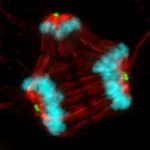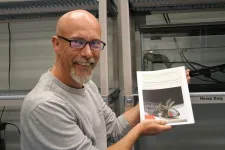(Press-News.org) A drug candidate, based on pioneering UCL and Moorfields Eye Hospital research and currently under development by SIFI S.p.A., has been found to be highly effective in treating a rare sight-threatening eye infection in a new international clinical trial.
The findings, published in Ophthalmology, describe the efficacy and safety of the first drug candidate for the treatment of Acanthamoeba keratitis (AK), applying a novel and evidence-based treatment protocol.
AK is one type of microbial keratitis (corneal infection) – a condition that results in inflammation of the cornea (the eye’s clear protective outer layer). AK can cause extreme levels of pain as well as light sensitivity.
AK is relatively uncommon, affecting about one in 37,000 contact lens wearers per year in the UK, but it is responsible for about half the cases of sight loss in this group. Contact lens wearers face an increased risk of the disease; a UCL and Moorfields team recently found that people who wear reusable contact lenses face nearly four times the risk of those wearing daily disposables, while showering with lenses in and wearing lenses overnight also each raised the risk by more than threefold.*
The treatment being studied, low concentration polihexanide (PHMB 0.02%), was first compounded and used in the 1990s to treat AK, introduced by a team co-led by this latest study’s lead author, Professor John Dart, and is widely recommended as a treatment for AK, but it is not a licensed drug, and treatment outcomes have been variable.
Professor John Dart (UCL Institute of Ophthalmology and Moorfields Eye Hospital NHS Foundation Trust) said: “Acanthamoeba keratitis in contact lens users can be prevented by following safe use advice: do use daily disposables if possible, wash and dry hands before handling lenses, maintain good lens and lens case hygiene, and don’t use them when bathing swimming or showering, or use goggles and renew the lens after use, don't wear them overnight, and don’t use them every day.
“Unfortunately, when the disease does develop the course is prolonged and, in the recent past, one third of patients have had poor visual outcomes with one quarter requiring surgery at some stage.
“PHMB 0.02% is an effective and widely recommended unlicensed therapy, but many clinicians have trouble accessing it, mistakes in formulation can sometimes lead to poor results, and the lack of a proven treatment protocol has resulted in wide variations in how the drug is used and in treatment outcomes. We hope that our new robust findings with polihexanide 0.08% will be a game changer for AK treatment, by improving access and the consistency of treatment, addressing currently unmet patient needs.”
The Phase 3 randomised controlled double blind clinical trial followed a Phase 1 trial in healthy volunteers which showed that a significantly higher concentration (0.08%) of polihexanide was safe to use. The Phase 3 trial was run in accordance with European Medicines Agency scientific advice and compared the efficacy and safety of a high concentration of polihexanide (0.08%) as a monotherapy to a widely used dual therapy, combining a lower dose of PHMB (0.02%) with propamidine. All trials were sponsored and funded by Italian pharmaceutical company SIFI, with partial co-funding by the European Commission.
The study involved the analysis of 127 people being treated for AK at six hospitals across Europe (in England, Italy and Poland).
The researchers found both formulations to be highly effective when used with the detailed drug delivery protocol, with medical cure rates of 110/127 (87%) overall and for each treatment individually, meaning 87% of people were cured of AK without needing surgery, one of the highest ever reported for AK. The treatment failure rate was 17/127 (13.4%), nearly half of whom required therapeutic corneal transplant surgery. The overall transplant surgery rate of 8/127 (6.3%) is one of the lowest reported in any case series of AK.
The researchers say that the widely recommended dual therapy was more effective than usual in this trial because clinicians were strictly following a set treatment protocol. In addition, the new monotherapy has advantages over dual therapy, as the simplicity reduces the risk of errors in practice.
Dr Vincenzo Papa (Head of Scientific Affairs at SIFI) and co-author of the study said: “This publication in Ophthalmology, the leading peer-reviewed journal in our field, further encourages our continued efforts to make polihexanide 0.08% (Akantior®) available to patients with AK, as the first approved orphan medicinal product. Given the extreme burden of the disease and the high unmet medical need, we are proud of the high efficacy outcomes in the robust setting that the trial created, especially when compared with the efficacy rates of 60% reported with the current best treatment.”
Based on the comprehensive quality, preclinical and clinical data package generated over 15 years of research, SIFI is now seeking regulatory approvals for polihexanide 0.08% in Europe, the UK and the US.
Juliette Vila Sinclair Spence, Rare Disease Patient Advocate & Chairwoman, Acanthamoeba Keratitis Eye Foundation, commented: “Exciting news! AK Warriors (aka patients) are now one step closer to receiving the first-ever product with a standardised protocol for Acanthamoeba keratitis. This is starting to bring light to the end of the tunnel.”
More about Acanthamoeba keratitis
AK causes the front surface of the eye, the cornea, to become painful and inflamed, due to infection by Acanthamoeba, a cyst-forming microorganism. The most severely affected patients (a quarter of the total) end up with less than 25% of vision or become blind following the disease and face prolonged treatment. Overall, 25% of people affected require corneal transplants to treat the disease or restore vision.**
Contact lens use is now the leading cause of microbial keratitis in patients with otherwise healthy eyes in countries in the global north. Sight loss resulting from microbial keratitis is uncommon but Acanthamoeba, although a rare cause, is one of the most severe and is responsible for about half of those contact lens users who develop sight loss after keratitis. 90% of AK cases are associated with avoidable risks. In recent years a UCL and Moorfields team found AK to be on the rise in South-East England.***
Furthermore, AK is also increasing in prevalence in some part of the global south, including parts of India, where the leading risk factor is agriculture associated corneal trauma. The findings reported here are also relevant to these populations.
* UCL News, 2022: Reusable contact lenses more than triple risk of rare preventable eye infection
** Further information on Acanthamoeba keratitis
*** UCL News, 2018: Outbreak of preventable eye infection in contact lens wearers
END
Effective treatment for rare sight-threatening infection
2023-10-27
ELSE PRESS RELEASES FROM THIS DATE:
Controlling waves in magnets with superconductors for the first time
2023-10-27
Quantum physicists at Delft University of Technology have shown that it’s possible to control and manipulate spin waves on a chip using superconductors for the first time. These tiny waves in magnets may offer an alternative to electronics in the future, interesting for energy-efficient information technology or connecting pieces in a quantum computer, for example. The breakthrough, published in Science, primarily gives physicists new insight into the interaction between magnets and superconductors.
Energy-efficient substitute
"Spin waves are waves in a magnetic material that we can use to transmit information," explains ...
$1.5 million DOD grant will create virtual reality test to assess TBI in the field
2023-10-27
One of the most common injuries sustained by military personnel in recent conflicts has been traumatic brain injury, or TBI. In response to this, and the fact that military operations are increasingly being conducted by small teams in far-flung areas, researchers in the University of Arizona College of Medicine – Tucson’s Department of Psychiatry are working on a portable virtual reality system to assess TBI in the field.
Psychiatry professor William “Scott” Killgore, PhD, and his team in the Social, ...
Antibody-drug conjugate helps patients with metastatic non-small cell lung cancer live longer, delaying disease progression
2023-10-27
Treatment with datopotamab deruxtecan (Dato-DXd), a novel Trop-2 directed antibody-drug conjugate, was found to significantly improve progression-free survival in patients with metastatic non-small cell lung cancer, an improvement that was primarily driven by patients with non-squamous tumors.
These results from the TROPION-Lung01 Phase III trial, which compared the standard of care in second-line docetaxel, a type of chemotherapy, with Dato-DXd, an antibody drug conjugate, in patients with pretreated metastatic non-small cell lung cancer, were presented at the European Society for Medical Oncology 2023 Congress by Dr. Aaron ...
UTHSC cancer researcher part of $3 million collaborative project studying obesity-related cancer
2023-10-27
A University of Tennessee Health Science Center (UTHSC) researcher is a member of a prestigious team that has just received a highly competitive Endeavor Award totaling $3 million from The Mark Foundation for Cancer Research.
Liza Makowski, PhD professor in Hematology and Oncology at the UTHSC Center for Cancer Research, is a co-principal investigator on the award, which funds collaborative projects tackling complex challenges in the prevention, diagnosis, and treatment of cancer. Entitled “Inflammatory Drivers of The Obesity-Cancer Connection”, the project is led by principal ...
Common chemotherapy drugs don't work like doctors thought, with big implications for drug discovery
2023-10-27
A new study from the University of Wisconsin–Madison suggests that chemotherapy may not be reaching its full potential, in part because researchers and doctors have long misunderstood how some of the most common cancer drugs actually ward off tumors.
For decades, researchers have believed that a class of drugs called microtubule poisons treat cancerous tumors by halting mitosis, or the division of cells. Now, a team of UW–Madison scientists has found that in patients, microtubule poisons don't actually stop cancer cells from dividing. Instead, these drugs alter ...
SynGAP Research Fund awards $100,000 for investigating the impact of SYNGAP1 missense variants using structural bioinformatics
2023-10-26
TURKU, Finland – October 27, 2023 – The SynGAP Research Fund 501(c)(3) announced a $100,000 grant to researchers Pekka Postila and Olli Pentikäinen from the Institute of Biomedicine and InFLAMES Flagship at the University of Turku. Prof. Pentikäinen’s research focuses on molecular modeling and computer-aided drug discovery. Assoc. Prof. Postila is an expert on advanced molecular dynamics simulations of complex biomolecular systems. The dual research team was formed to study the structural effects of missense variants on the SynGAP protein, whose normal functioning ...
Something to chew on: Researchers look for connections in how animals eat and digest food
2023-10-26
Oct. 26, 2023
Media contacts:
Emily Gowdey-Backus, director of media relations, Emily_GowdeyBackus@uml.edu
Nancy Cicco, assistant director of media relations, Nancy_Cicco@uml.edu
UMass Lowell’s Nicolai Konow wants to bridge the gap between research on food processing and nutrient absorption.
“There is a divide between biomechanists, who study chewing and food transport, and physiologists, who examine what actually happens to food in the gastrointestinal tract,” said the assistant professor ...
Viral reprogramming of cells increases risk of cancers in HIV patients
2023-10-26
Viral infections are known to be a central cause of more than 10% of cancers worldwide. University of California researchers may have uncovered one of the key reasons why. Their findings were published today in PLOS Pathogens, a journal that reports groundbreaking work to advance understanding of how pathogens impact diseases such as cancer.
UC Davis Comprehensive Cancer Center researcher Yoshihiro Izumiya teamed up with Michiko Shimoda, who previously worked in the Izumiya Lab at UC Davis. Currently, she is a member of the Core Immunology Lab at UC San Francisco. Together, they led UC Davis researchers in the study of Kaposi’s sarcoma-associated herpesvirus (KSHV). The ...
Robot stand-in mimics movements in VR
2023-10-26
Media Note: Pictures of VRoxy can be viewed and downloaded here: https://cornell.box.com/v/VRoxyrobotproxy
ITHACA, N.Y. – Researchers from Cornell and Brown University have developed a souped-up telepresence robot that responds automatically and in real-time to a remote user’s movements and gestures made in virtual reality.
The robotic system, called VRoxy, allows a remote user in a small space, like an office, to collaborate via VR with teammates in a much larger space. VRoxy represents the latest in remote, robotic embodiment.
Donning a VR headset, a user has access to two view modes: Live mode shows an immersive image of the ...
Major milestone achieved in new quantum computing architecture
2023-10-26
Coherence stands as a pillar of effective communication, whether it is in writing, speaking or information processing. This principle extends to quantum bits, or qubits, the building blocks of quantum computing. A quantum computer could one day tackle previously insurmountable challenges in climate prediction, material design, drug discovery and more.
A team led by the U.S. Department of Energy’s (DOE) Argonne National Laboratory has achieved a major milestone toward future quantum computing. They have extended the coherence time for their novel type of qubit to an impressive 0.1 milliseconds — nearly a thousand times better than the previous record.
“Rather ...




